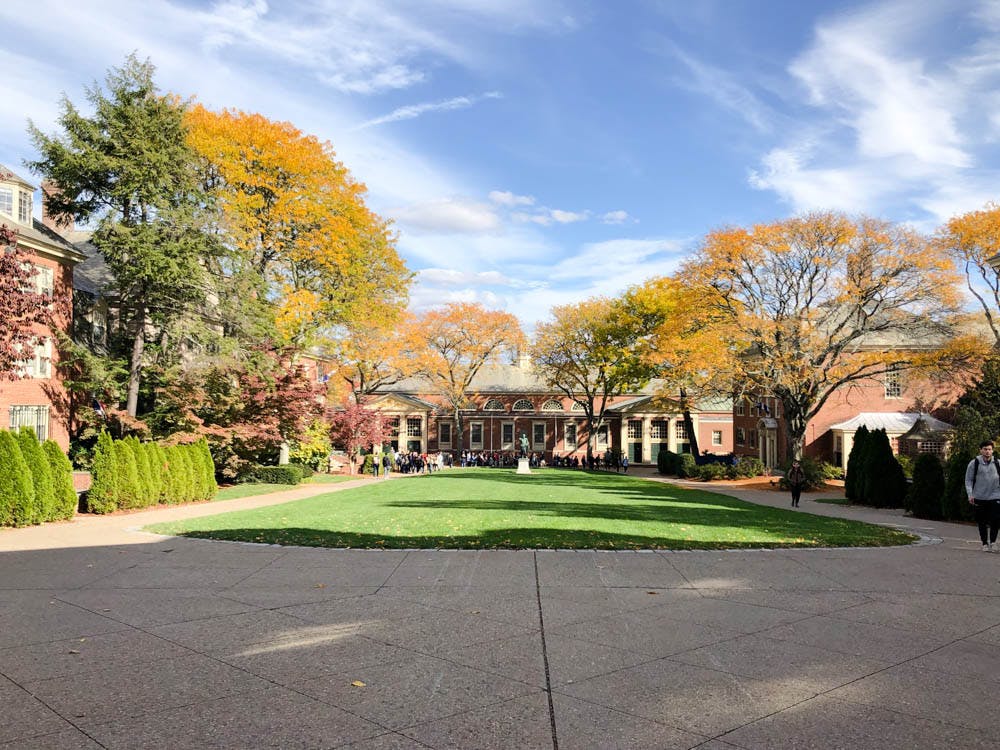Since last spring, the Department of Facilities Management has replaced all of the hot water tanks on Wriston Quadrangle and in Graduate Center, wrote University Spokesperson Brian Clark in an email to The Herald.
Facilities Management, in collaboration with the Undergraduate Council of Students, the Division of Campus Life and Student Services and the Office of Sustainability, will also launch a pilot program this spring to install water bottle fillers in Keeney Quadrangle, Grad Center, Vartan Gregorian Quadrangle and Emery and Woolley halls, Clark wrote.
Discolored tap water resulted from “hot water tanks that were faulty and caused premature rusting in some residence hall buildings,” he wrote. “This was only a problem with hot water, which is not typically used for drinking, and the discoloration did not result in unsafe water quality.”
The project to replace hot water tanks followed student advocacy efforts led by UCS President William Zhou ’20, UCS Vice President Jason Carroll ’21 and UCS Chief of Staff Melissa Lee ’20 to improve water accessibility and quality on campus.
In the UCS 2019 Fall Poll, 59.1 percent of student respondents said that they were “somewhat” or “very uncomfortable” drinking the tap water in their dorm, so UCS “felt really passionate about addressing this issue,” Zhou said.
Facilities completed the first phase of the project over winter break and plans to work with the Office of Residential Life to replace rusted hot water tanks in Emery, Woolley, Morriss and Champlin halls and the Verney-Woolley Dining Hall this academic year, said Director of Design and Construction Anthony Casello. Replacing hot water tanks in occupied buildings, such as the Verney-Woolley complex, poses a challenge because of its effect on the availability of hot water, he added. “We are trying to do it without impacting students.”
Funding to replace the hot water tanks came from the Facilities Renewal Fund, according to Casello.
In addition, to increase accessibility to filtered water, the spring pilot program will bring “point-of-use gooseneck bottle fillers (to) existing sinks” on campus, Clark wrote. Based on the UCS 2019 Fall Poll, “the kitchens in Keeney, Grad Center, (Vartan-Gregorian Quandrangle) and Emery Woolley have been identified as the best candidates to install point-of-use gooseneck bottle fillers at existing sinks,” he added. If the pilot is “deemed successful, more residence halls may receive hydration stations in the future.”
Casello said that Facilities Management estimates that “all those filters will be installed in the next month or two, but we need to finalize our schedule and also figure out when we can get access to all those kitchen areas.” He added that Facilities Management is “still figuring out where we will get the funding for it from, but I think it is going to come out of our same Facilities Renewal Fund.”
Lee said that UCS plans to advocate for filtered water stations to be included in all future buildings the University constructs or renovates.
In addition to improving water accessibility and quality, UCS also hopes to help make the community feel more comfortable drinking the tap water on campus by publishing the results of lead tests Facilities has conducted over the past decade, Zhou said. “Some of UCS’s long term goals are to increase transparency around testing and lead levels and to have the data easily accessible.”
“Brown has done extensive proactive water sampling to determine lead levels,” Clark wrote. “During all testing within the last decade-plus, all Brown residence halls have been within the (Environmental Protection Agency’s) standards for all buildings.”
“While we have not faced water quality issues with the potential to affect health of the Brown community,” he added, “we continue to take steps to alleviate concerns about water discoloration and access to hydration stations.”





